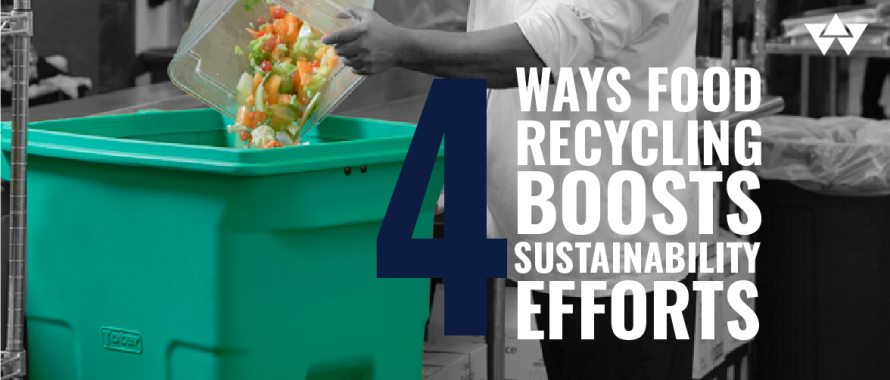Concerns about food waste in the U.S. are valid and for more than one reason.
The U.S. Department of Agriculture says 30 to 40% of the nation’s food supply goes to waste. That’s enough food to help families in need. And it's a huge concern for environmental reasons, too, for losses that include:
- Energy
- Labor
- Land
- Water
The food industry expends these resources on many levels, such as:
- Disposal
- Preparation
- Processing
- Production
- Storage
- Transport
The greatest environmental threat is the methane produced when food goes to landfills. Methane is a greenhouse gas even more powerful than carbon dioxide. And it's a chief contributor to ground-level ozone formation. In fact, the U.N. Environment Programme, an authoritative environmental advocate, estimates that methane is 80 times stronger at warming the globe than carbon dioxide in a 20-year period.
Improving your food-waste management has become critical on a global scale. Read on to discover four ways food waste recycling can help boost your sustainability efforts.
First, what is food waste recycling?
Rather than going into landfills, food waste can undergo anaerobic digestion. This results in two positive byproducts: biogas and soil amendment. Biogas can serve as a vehicle fuel or can be used for electricity generation and heating.
As part of the anaerobic digestion process, unused food goes to facilities to digest the organic elements. Wastewater treatment plants and manure digesters also can process food waste.
4 ways food waste recycling can help boost your sustainability
1. It lessens methane emissions from landfills
What conscious company wouldn’t like to decrease its carbon footprint? Recycling food waste saves the energy and resources needed to transport food waste to landfills. Volatile organic compounds — known as VOCs — are also diminished. And it takes care of other local pollutants, too.
2. It reduces the blue water footprint
This refers to the consumption of groundwater and surface water, which is estimated to be about 60 cubic miles for food wastage. That's more than 1.5 times the volume of Lake Tahoe, according to estimates from online corporate responsibility checker Triple Pundit. The organization also estimates that uneaten food accounts for 1.4 billion hectares of land. That equates to 30 percent of global agricultural land.
3. It supports the EPA’s food-recovery hierarchy
The Environmental Protection Agency has developed a systems theory for food waste management. Represented by an inverted pyramid that details preferred processes for food waste management, it contains six levels, from most to least preferred:
a. Source reduction. Reduce the volume of surplus food generated.
b. Feeding hungry people. Donate extra food to food banks, soup kitchens, and shelters.
c. Feeding animals. Divert food scraps to animal food.
d. Industrial uses. Provide waste oils for rendering and fuel conversion, and food scraps for digestion to recover energy.
e. Composting. Create a nutrient-rich soil amendment.
f. Land/incineration. This represents the last resort of disposal
4. It saves you money
Some trash haulers offer lower fees if food gets separated from trash. Those service providers can send the food waste to a compost facility rather than a landfill. Donating food is also an option that could bring tax benefits. Further, finding ways to spend less by preventing waste to begin with can save you money on both fronts — not to mention the reduced labor and resources costs of producing food that will wind up wasted.
It’s easy to get support from your container brand
Some container suppliers are as dedicated to sustainability as you are. One such supplier is Toter, a Wastequip company. Municipalities and waste haulers consider Toter carts the most sustainable on the market. They’re durable, made of recycled content, and are recyclable themselves after a long life.
Toter’s organic bins make for easy collection and transport of organics from your home. Made out of durable, high-density polyethylene, they’re also built to last.
Wastequip, Toter’s parent company, offers a line of organic products for business use. Using these highly durable products helps you stay in compliance with California’s SB 1383 guidelines:
- Organic two-wheel collection carts — Designed to accommodate heavy, organic, wet waste
- Organics collection container — Strong as steel, flexible as plastic
WORK WITH A LEADER IN WASTE SUSTAINABILITY. CONTACT OUR EXPERTS AT TOTER TODAY
Do your part to support food-waste reduction
We can all compost food scraps to enrich the soil and reduce methane emissions. We can also scale up those actions by using organic bins with an extended lifetime. Byproducts of these actions benefit our communities, our environment, and our future.
Sources:
Triple Pundit
https://www.triplepundit.com/
U.N. Environment Programme
https://www.unep.org/news-and-stories/story/methane-emissions-are-driving-climate-change-heres-how-reduce-them
